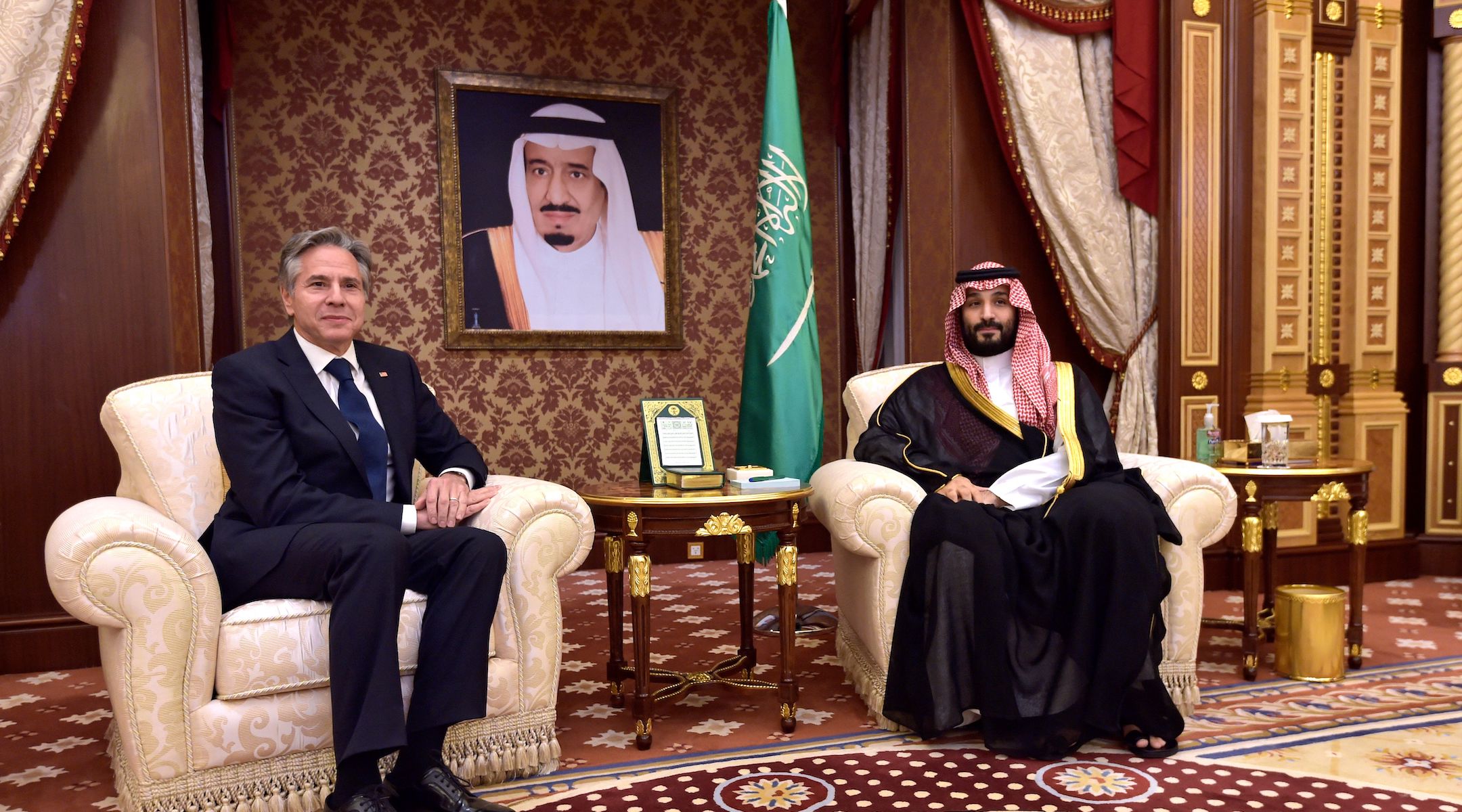Saudi Arabia appoints first Palestinian envoy as Saudi-Israel normalization talks continue
The move also comes as Israeli leaders have tried to downplay the importance that Palestinian statehood holds in deal negotiations

Saudi Arabia’s Crown Prince Mohammed bin Salman meets with U.S. Secretary of State Antony Blinken in Jeddah, June 7, 2023. (Amer Hilabi/Pool/AFP via Getty Images)
(JTA) — Saudi Arabia appointed its first-ever envoy to the Palestinian Authority on Saturday, in the midst of ongoing negotiations with Israel and the United States about what would be a historic Saudi-Israeli diplomatic normalization agreement.
Nayef Al-Sudairi, the Saudi envoy to Jordan, will now also serve as a “nonresident ambassador to the State of Palestine,” the Saudi foreign ministry announced.
Saudi Arabia and Israel have been in U.S.-brokered discussions for months about the potential for Saudi Arabia to join some of its other Arab neighbors in formally recognizing Israel and establishing diplomatic relations with Jerusalem. The United Arab Emirates, Bahrain, Sudan and Morocco have since 2020 signed agreements with Israel on trade, tourism, security and more under a framework known as the Abraham Accords.
Saudi Arabia has made it clear in negotiations that Israel would have to make concessions that could lead to a two-state solution. The oil-rich kingdom recognizes Palestinian statehood in the West Bank, Gaza and East Jerusalem, and it has historically maintained that it would not establish diplomatic relations with Israel until conflict with the Palestinians is resolved.
Israel’s current right-wing government is firmly opposed to Palestinian statehood. But the Wall Street Journal reported last week that the United States and Saudi Arabia had agreed on the “broad contours” of what a deal with Israel could look like, with a possible timeline of nine to 12 months. Saudi Crown Prince Mohammed bin Salman would not agree to a deal as sweeping as the Israel-UAE agreement, which covers sectors from security to scientific cooperation, the report noted.
The Palestinian envoy appointment comes as Israeli leaders have downplayed the importance that Palestinian statehood holds in deal negotiations. “It’s sort of a check box,” Israeli Prime Minister Benjamin Netanyahu told Bloomberg News earlier this month. “You have to check it to say you’re doing it.”
Israeli Foreign Minister Eli Cohen said in an interview on Sunday that the envoy appointment shows “The Saudis want to convey a message to the Palestinians that they were not forgotten,” but added “the Palestinian issue is not the main issue within the talks.”
This article originally appeared on JTA.org.
A message from our CEO & publisher Rachel Fishman Feddersen
I hope you appreciated this article. Before you go, I’d like to ask you to please support the Forward’s award-winning, nonprofit journalism during this critical time.
We’ve set a goal to raise $260,000 by December 31. That’s an ambitious goal, but one that will give us the resources we need to invest in the high quality news, opinion, analysis and cultural coverage that isn’t available anywhere else.
If you feel inspired to make an impact, now is the time to give something back. Join us as a member at your most generous level.
— Rachel Fishman Feddersen, Publisher and CEO